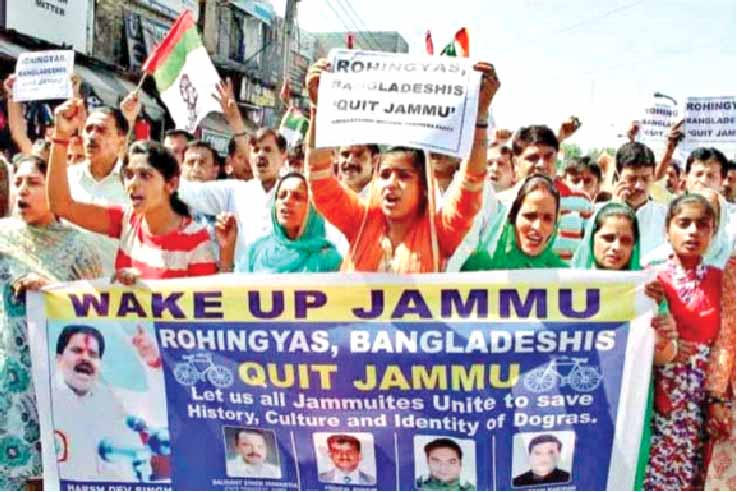Detection and deportation of illegal migrants including Rohingya migrants from Myanmar after due process of nationality verification is a continuous process. Central Government has been vested with powers under sections 3(2)(e) and 3(2)(c) of the Foreigners Act, 1946 to detain and deport foreign nationals staying illegally in the country”. – Ministry of Home Affairs, in a written reply in the Rajya Sabha on February 3, 2021 regarding, ‘DEPORTATION OF ROHINGYA MIGRANTS’

The detention of so-called Rohingyas, the illegal Muslim migrants from the ethnically divided Rakhine State of Myanmar, in Jammu is in news. Not surprisingly, the ‘fake-liberals’ who claimed to be champions all humanitarian causes have started hue and cry about this act of the Government. Internationally also the case of Rohingyas is generally discussed as a refugee crisis. Instead of getting into fake narratives, we need a clear and coordinated strategy to mitigate this kind of menace.
As per the international convention on refugees, they are persons who are outside their country and cannot return owing to persecution or a well-founded fear of persecution. By this definition, Rakhine Muslims perfectly fit into the ‘refugee crisis’ category. But, if we go into the history of their persecution, the Buddhist nationalists of Myanmar had to resort to resistance when the Muslims migrated from the present areas of Bangladesh in huge numbers during the British rule and then after 1981. Despite their aggressive posturing and trying to team up with Mohammad Ali Jinnah to join Pakistan, they were given due representation in the governance and administration of then Burma. The way the Rakhine Muslims changed the demography of the region and showed their intolerance towards the Buddhist monks and places of worship by building the Arakan Rohingya Liberation Army (ARLA). The mindset of Islamic Umma perpetrated by fundamentalist groups which puts religion above nationality is the root cause of most of the conflict all over the world. This is true with the Rakhine ethnic crisis also. Otherwise, in the conflict with Buddhist nationalists, the ARLA would not have massacred Hindus in Myanmar for any reason.
Seeing this solely through a religious prism is also a dangerous ploy. If this was just a ‘Muslim’ migration issue then Islamic countries like Bangladesh and Malaysia would not have thrown these illegal migrants in the waters. Bangladesh Prime Minister called the ‘Rohingya Crisis’ as a ‘threat to the security’ of the entire region; while the Home Ministry of Malaysia categorically refused to recognise any group advocating the cause of Rohingya, terming them as ‘illegal immigrants’.
In Bharat also the situation is not different. If Rohigyas were genuine refugees, they would not have travelled from the sensitive border of Bharat-Bangladesh to far-flung areas like Jammu, Hyderabad and Ernakulam. The rackets busted in Unnao, Aligarh and Noida are on the basis of input received from the Lucknow-based Military Intelligence (MI) unit where three Rohingyas were facilitating others from Bangladesh and Myanmar to acquire citizenship documents like passports to settle down in Bharat. This shows their real intent. Jaish-e-Mohammed chief Maulana Masood Azhar’s support to Rohingya Muslims who are staying in Jammu and Kashmir and their links with Aqa Mul Mujahideen (AMM) leaders, who were trained in Pakistan, is all the more worrying.
Bharat is already hosting largest number of illegal migrants in South Asia. Successive Governments, Group of Ministers, experts and Supreme Court of Bharat have ringed the alarm bells against this trend. Instead of giving the entire issue a communal colour, playing soft stories of individuals, there is a need to evolve a comprehensive strategy to mitigate the menace. Bharat is neither a signatory to the 1951 UN Resolution on Refugees nor it has ratified 1967 protocols; therefore, we have no obligation towards these illegal migrants. On the humanitarian grounds, Bharat is already providing help to Bangladesh to manage the refugee camps. The strategy to deport these illegal migrants to these bordering areas, cracking down on networks that have been helping them to settle down in Bharat through illegal routes and eventually, helping them to resolve their crisis is the best way forward.
@PrafullaKetkar














Comments